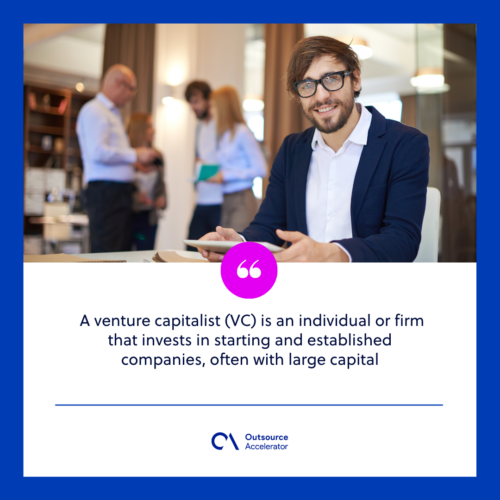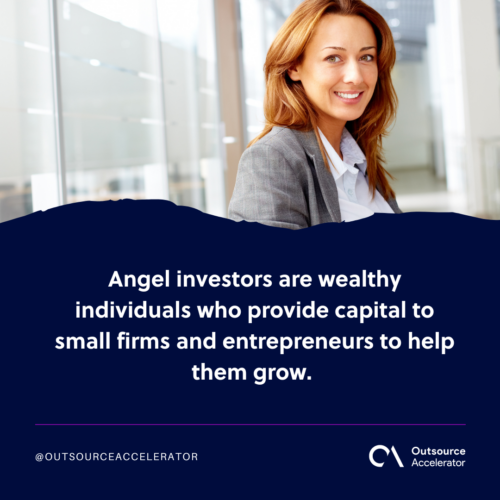Venture capitalist vs. Angel investor: How they can help your business

Since a startup company, or startup, and small businesses are still relatively new, it may struggle with funds while building a company foundation without generating enough revenues to sustain itself.
Starting a business is an exciting venture, but let’s face the truth: it’s not as easy as it seems.
That is why startups and small businesses attract investors to help them keep their businesses running when they are starting up.
While family members and friends could lend some funds, startups may need more than that, like additional capital or funding, to stabilize their businesses.
Modernized economies introduced plenty of financial platforms that support the growth of small businesses, such as venture capitalists and angel investors.
But beginners may be confused about the difference between the two, so this article will help clarify who these investors are and which is the perfect partner for your business.
Venture capitalists
First, let’s define what a venture capitalist is. A venture capitalist (VC) is an individual or firm that invests in starting and established companies, often with large capital.
These financial investors often don’t invest in high-risk startups with their own money. Instead, they combined assets from other investment firms or big businesses.
VC firms also frequently choose industry-changing startups with promising development prospects to invest in. Facebook was one of those firms that received startup funding through venture capital, which provided it with sufficient financial support to achieve tremendous success.
In exchange for investing money in the company, the venture capitalist acquires an equity stake, which is the percentage of a business owned by the holder of some shares of stock in a company.
Through this, VCs can buy the business after some time or, on the occasion of an initial public offering (IPO), purchase a significant portion of its shares.
However, once a company has established its initial business model and earned sufficient proof of market traction, venture capital firms often invest; when a business reaches a later stage of development to lessen the risk of losing investments.

3 rounds of venture capitalist investment
Startups seek investment first before getting into VC investments. As its business evolves, it usually matures through a series of investment rounds, beginning with seed capital and eventually leveling up to the fundraising rounds categorized as Series A, B, and C.
To understand VCs better, one must also be aware of the terms “Series A, B, and C,” which pertain to the growth stage of a business requiring venture capital investment.
1. Series A
Series A funding is the start of a company’s initial round of VC funding. A business needs to take its startup concept to an actual, managed entity with real revenue.
In that case, developing a long-term business model is critical since investors seek startups with clear and robust strategies to transform innovative ideas into lucrative businesses.
This funding is typical for startups that have already achieved operational stability and want to obtain additional funds, build their customer base, and establish the products or services they offer.
2. Series B
This next investment round is for companies past the development stage and seeking to expand. In Series B funding, entrepreneurs receive additional capital from their existing investors to grow their businesses further.
Investors in this round often include VCs interested in increasing their investment value. In return, VCs help companies meet large-scale demands such as sales, advertising, tech, support, and hiring more employees.
3. Series C
Series C funding is the last and largest financing round in venture capital investments. Here, companies use the funding to accelerate growth and expand their reach.
Entrepreneurs also seek this round of funding for their product development phases, market expansions, or processing acquisitions of more businesses.
Series C investors are from top financial markets, including private equity firms, hedge funds, and investment banks.
Angel investors
Angel investors are wealthy individuals who provide capital to small firms and entrepreneurs to help them grow. They are often referred to as “angels” because, unlike venture capital firms, they invest in small, risky, and unproven businesses and use their own money for investing.
Many startups are still unestablished and trying unproven business ventures but desperately need funding. While most investment firms fear investing in them due to their high risk, someone will come to save the day, just like an angel.
Angel investors deal with high investment risk, but they also ensure high returns.

Why choose an angel investor?
If you are a startup owner just starting your business from scratch, angel investors may help you achieve your full business potential for the following reasons:
Risk-takers
Angel investors are risk-takers because they can invest in companies that have the potential to become great venture capitalists. This is because angels have high hopes to double or triple their investment.
Experienced angel investors have already factored their investments as high-risk and may have strategies for backup in the event of no investment returns.
Angels could also nurture business founders with decision-making, such as developing a product-market fit and planning market launches. With all these advantages, a seasoned investor is a blessing.
Alternative to bank loans
Since loans don’t require equity in the business, don’t meddle with operations, and aren’t involved with management decisions, acquiring a loan may be preferable to angel funding in some cases.
However, startups typically lack sufficient funds to reimburse loans, which is why angel funding can be a better option for early-stage companies.
Venture capitalist vs. Angel investor: A comparison
All businesses need capital to operate, and angel investors and venture capitalists provide financial investments in companies through funding. In that case, who might be the perfect partner for a startup? Is it the risk-taking angel investors or the trusty VCs?
Like most scenarios, it depends on the business owner and their situation.
But to make it more transparent, here are some areas where an angel investor and a venture capitalist differ:
Source of investment
Venture capital investors work for a risk capital company using other people’s money for investment. A venture capital firm typically invests other people’s money, with their investments placed in the form of venture capital funding for pensions, endowments, and large trusts.
In contrast, angel investors invest their own funds in fledgling businesses.
Both investors vary in investment amounts. While a VC typically invests a bigger capital than angel investors, it also means they have a higher equity stake that can potentially lead to buying out founders from a business.
Angel investors are known as risk-takers and willing to invest in high-risk businesses, while VC firms require first a growth potential before they invest.
Motivation and responsibilities
Both investors differ in motivations and responsibilities when investing.
Angel investors mainly provide financial support, but their level of involvement can be modified according to the founder’s needs and the angel’s motivations. This means they can give advice and share contacts from time to time.
Meanwhile, venture capitalists usually demand some level of operational control, such as involvement in decision-making and strategy or project planning. They prefer to be hands-on when offering professional advice and can act as a sounding board for CEOs.
Investment limitations
Angel investors are best for early-stage businesses that need sufficient funds to start and run their operations. While angels can be wealthy and accredited investors, their investment amount may be limited compared to venture capitalists.
VCs may invest a larger amount of capital but are only limited to businesses that have already proven themselves in the market to minimize potential risks that can harm their entire organization.
Due diligence
Due diligence is the audit of a company to identify potential business liabilities or deficiencies to reduce risks and uncertainties before the investment begins.
Angel investors rarely exercise due diligence, given that most of the money comes from them. However, research shows that angels are more likely to receive profit when they offer 20 hours of due diligence.
In contrast, venture capitalists are limited partners with fiduciary duties in the company and are, therefore, required to perform more due diligence.
In the end, venture capitalists and angel investors could be the perfect investors for a startup company, depending on its size and situation. An angel investor might be the best option if you’re a business owner with an innovative concept for a business.
But if your company has already launched but needs additional capital to develop, then a venture capitalist could help.







 Independent
Independent




